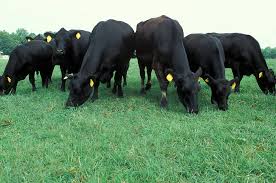A look at the effectiveness in using monesin in beef cattle grazing low-quality forages.
In Florida, warm-season grasses can be of low quality, a factor that can negatively impact animal performance when extensive grazing systems are used, according to a South Florida Beef-Forage Program article. Limited fertilization, fixed and continuous stocking rates and freezing events from the winter season can all decrease the nutritive value of warm-season grasses. Many beef cattle operators turn to growth promoters like Ionophores. Recent studies have looked at the effectiveness of using monesin, a Ionophore, in beef cattle. See the results below.
Monesin and Beef Cattle
“The benefits of concentrate supplementation on the performance of beef cattle grazing warm-season grasses have been well reported in the literature; however, producers are often limited in the use of this management practice due to increased prices of concentrate supplements. Therefore, it is important to maximize the efficiency of supplements in the periods of limited forage,” according to the article.
“Ionophores has been used as a growth promoter in the livestock industry for decades and numerous studies have presented positive responses for these growth promoters on ruminants receiving diets with high levels of concentrate,” the article shares, adding “However, the effectiveness of these growth promoters on beef cattle grazing low-quality forages on extensive grazing systems is not consistently reported.”
A study conducted at the UF/IFAS Range Cattle Research and Education Center in Ona, FL tested the effects of monensin supplementation on 2-year old beef heifers grazing bahiagrass pastures at a stocking rate of one heifer per acre. The article maintains, “However, there was no effect of monensin supplementation on average daily gain, blood glucose, and insulin at either stocking rate. The same heifers were moved to a drylot and similar total DM intake and forage DM intake were observed between the control and the heifers receiving monensin. In Oklahoma, Linneen et al. (2015) tested the effects of monensin supplementation on mature cows receiving low-quality forage and observed that there was no difference in cow BW and BCS change during the experimental period.”
Additionally, the article maintains, “Despite of the lack of response in animal performance, research conducted at Ona observed there was an improvement in ruminal conditions (greater propionate concentration) in fistulated steers receiving increasing levels of monensin (from 0 to 375 mg/d) on low-quality forage diets. The magnitude of the increase in propionate was not sufficient to increase levels of blood glucose and insulin, and increase animal performance.”
The conclusion of the article is that, “it is unlikey that cattle grazing low-quality forages with limited or no concentrate supplementation will improve performance with monensin supplementation. Conversely, when greater levels of concentrate are offered to calves grazing low-quality forage pastures, monensin has been effective to improve performance and decrease coccidia count of beef cattle. Further research is necessary to identify potential benefits of using monensin on beef cattle grazing low-quality forages in extensive grazing systems.”
Griffin Fertilizer is committed to helping both growers and ranchers make sound agronomic and economic decisions in order to maximize the health of their grove and pasture. As a full-service custom dry & liquid fertilizer blender and crop protection product distributor, we will continue our mission to further advance Florida agriculture. For questions or concerns about your farm or pasture, contact us and one of our team will be in touch.

